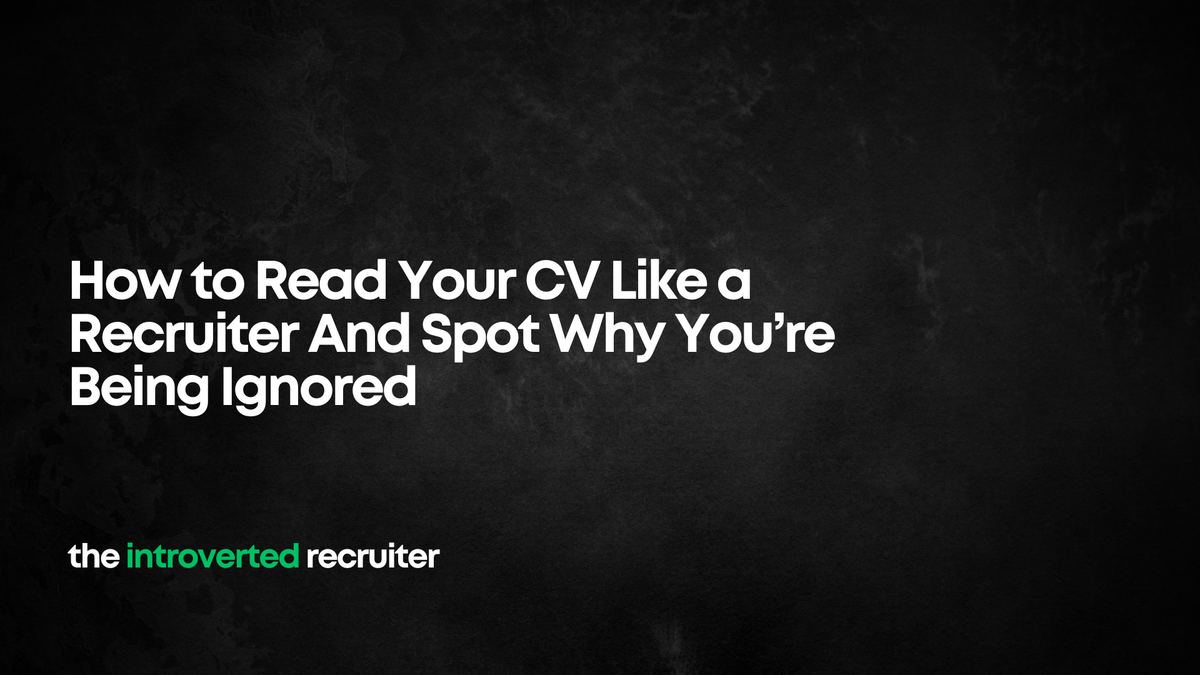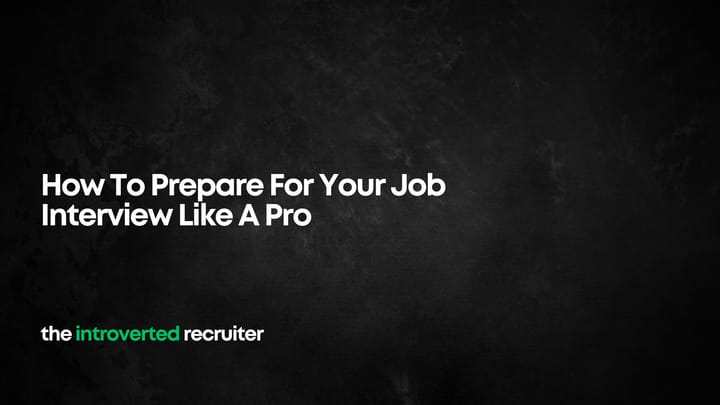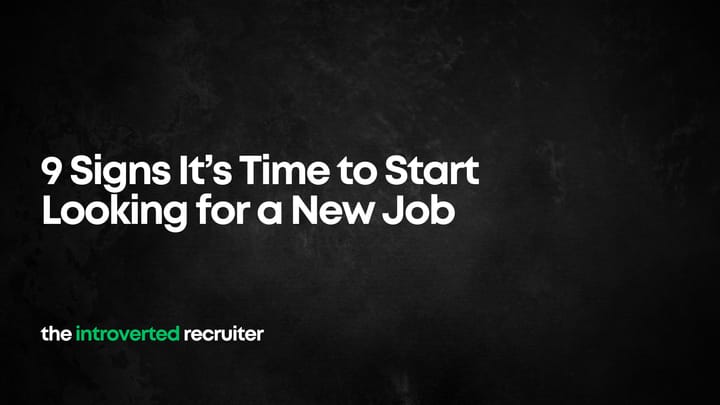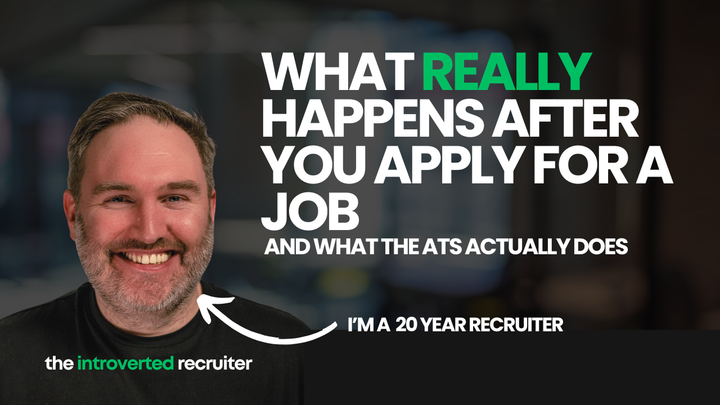How to Read Your CV Like a Recruiter And Spot Why You’re Being Ignored

Ever applied for 10, 20, even 30 jobs and heard absolutely nothing back?
No calls. No emails. No feedback. Just deafening silence.
If that's happening to you, I can almost guarantee the problem lies with your CV.
And before you start beating yourself up, it’s not your fault.
There’s so much bad advice floating around about CV writing that it’s hard to know who or what to trust anymore.
I’ve been in recruitment and talent acquisition for two decades, and I can tell you one thing for certain: recruiters aren’t reading your CV properly.
They’re skim reading it. Quickly. Making a judgement call in six seconds flat.
If your CV doesn't survive that skim, you're out before you've even had a chance to get a foot in the door.
Here’s how to tell if your CV is being skipped — and what to do about it.
Why You Only Get Six Seconds
Recruiters are under the pump.
Hundreds of applications. Unrealistic hiring manager demands. Tight deadlines.
They don't have the luxury of reading every CV word-for-word.
When your CV lands on their desk (or more realistically, their screen), they’re scanning for one thing:
Can this person do the job I'm hiring for?
If they can't figure that out within a few seconds, they're moving on to the next application.
It’s not personal. It’s survival mode.
What They're Actually Looking For in Those Six Seconds
When a recruiter skims a CV, their eyes typically land on:
- Top of Page 1 — Your name, headline or job title, location, and contact details
- Professional Summary — A couple of punchy lines telling them who you are and what you bring
- Key Skills — Easy to find, not buried at the bottom
- Most Recent Role — Where you work now, what you do, and whether it’s even close to what they need
If they can find all that — and it matches what they're looking for — you’ll go into the “maybe” pile.
If they can’t, it's straight into the "no" pile.
Self-Audit: How to Tell If Your CV Will Be Skipped
If you want to properly check your CV, here’s a detailed checklist to walk yourself through:
1. Is there a clear job title or headline at the top?
You should have a professional title or headline right underneath your name.
For example:
- Senior Digital Marketing Manager
- Experienced Software Engineer | Java, AWS, DevOps
- Finance Business Partner | ACA Qualified
If the recruiter has to guess what job you do, you’ve already lost their attention.
And no, "Curriculum Vitae" is not a headline.
2. Is your location clearly visible?
Recruiters need to know where you are based.
Even for remote jobs, some companies need people in specific time zones or regions for compliance reasons.
Just your town or city is enough. You don’t need your full home address — nobody needs to know your house number anymore.
3. Is your professional summary doing its job?
Your professional summary isn’t a paragraph of buzzwords.
It’s a positioning statement that answers three questions:
- Who are you?
- What do you specialise in?
- Why should someone care?
A good professional summary is two or three sentences that pack a punch.
It should give the recruiter a reason to keep reading.
If your summary could apply to anyone in any job, it’s doing you no favours.
4. Are your key skills listed clearly and relevant to the role?
Your key skills section should:
- Be easy to skim (bullet points, not a chunky paragraph)
- Contain six to eight skills max
- Match the skills that employers are actually asking for in the job ads you’re applying to
For example, listing "Leadership" is fine — but listing "Team Leadership in Agile Environments" is better if you’re applying for tech roles.
This isn’t about keyword stuffing — it’s about making your CV match what the recruiter is searching for.
5. Is your most recent job selling your achievements, not just your tasks?
Recruiters are looking at your most recent role first.
If it’s a sea of bullet points listing what you did rather than what you achieved, you’re missing a huge opportunity.
You want:
- Two short paragraphs explaining what your job involved and the context (team size, budget responsibility, projects worked on)
- Two to four bullet points calling out your key achievements, ideally with numbers or results
For example:
- Increased website conversion rates by 35% over 12 months through targeted A/B testing
- Delivered £400k in annual savings by renegotiating supplier contracts
If you only talk about your responsibilities, you sound exactly like everyone else.
Achievements are what make you stand out.
6. Is your CV easy to read and skim?
If your CV is crammed full of tiny writing because you’ve tried to squeeze it onto two pages, or if you’re using a fancy two-column layout, you’re making life harder for yourself.
Recruiters are looking for:
- Single-column layout
- Logical section headings
- Decent-sized font (minimum 11pt)
- Good spacing between sections
- No graphics, headshots, or distracting designs
Simple and clean always beats fancy and unreadable.
7. Have you removed irrelevant or ancient jobs?
Detail the last 8–10 years properly. Anything before that?
Just list:
- Job title
- Company name
- Dates
You don't need to drag out all the duties of a call centre job you had in 2005 if you’re applying for senior finance roles now.
Focus on what matters to the job you’re applying for.
8. Are you leaving out unnecessary distractions?
You do not need to include:
- Full postal address
- Hobbies (unless directly relevant)
- A photo of yourself
- Personal statements like “references available upon request”
Anything that doesn’t help you get the interview doesn’t belong.
What To Do If Your CV Doesn't Pass the Test
If your CV didn’t tick every box in that checklist, don't panic.
Most CVs don’t get it right the first time.
The important thing is now you know where the gaps are, you can fix them properly.
- Clean up the top half of your CV so it clearly shows who you are and what you do
- Lead with achievements, not just tasks
- Make it easy for someone to skim-read and instantly see your value
- Focus your CV around the job you want, not the job you have
Your CV’s only job
Your CV has one job: to get you an interview.
Not to tell your life story. Not to impress people with how many responsibilities you had 10 years ago.
Just to make someone want to pick up the phone and call you.
If your CV doesn’t make it through the 6-second skim, it doesn't matter how good you are — because nobody will find out.
I’ve a couple of things that will massively improve your CV and help you land job interviews.
First my free CV Template, it’s helping hundreds of people land job interviews.
Secondly, my AI CV Reviewer which actually reads your CV like a recruiter (me) would and gives you direct feedback. I personally trained it with my 20 years hiring experience.
Cheers
Lee
Follow Me
Find me on LinkedIn , TikTok , YouTube or Instagram where I share lot’s of practical no nonsense advice.



